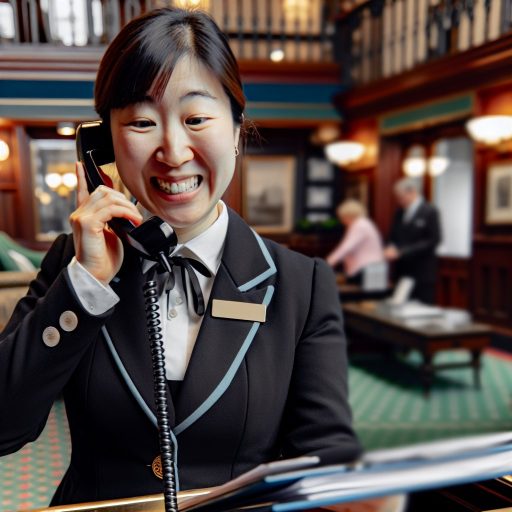Overview of the Spa Management Industry
The spa management industry plays a vital role in the wellness sector.
It encompasses various services, including massage, skincare, and holistic treatments.
This industry has experienced significant growth in recent years.
More individuals are prioritizing self-care and relaxation in their lives.
Scope of Spa Management
Spa management involves overseeing daily operations at a spa facility.
Managers coordinate employee schedules and ensure high service standards.
They also handle finances, marketing, and customer satisfaction.
Creating a positive atmosphere is essential for client retention and loyalty.
Career Opportunities
The industry offers diverse career paths for aspiring spa managers.
Positions range from spa directors to wellness coordinators.
Some professionals may specialize in specific treatments or services.
Others may focus on business development and marketing efforts.
Trends Influencing the Industry
Several trends shape the future of spa management today.
Technology integration has become increasingly important in the sector.
Furthermore, eco-friendly practices are gaining popularity among consumers.
As a result, many spas are adopting sustainable methods and products.
Importance of Customer Experience
Delivering exceptional customer experiences is critical in spa management.
Spa managers must train staff to provide personalized services.
Gathering client feedback helps improve offerings continuously.
Creating memorable experiences enhances brand loyalty and referrals.
Importance of Education in Spa Management
Education plays a vital role in spa management success.
It enables managers to understand both business operations and wellness practices.
Proper education fosters effective leadership and communication skills.
Additionally, it equips managers with knowledge of industry standards.
This knowledge is essential for maintaining a high-quality spa experience.
Unlock Your Career Potential
Visualize a clear path to success with our tailored Career Consulting service. Personalized insights in just 1-3 days.
Get StartedEnhancing Professional Skills
Education enhances the professional skills required in spa management.
Managers must be adept at customer service and staff management.
Understanding marketing and financial principles is also crucial.
Moreover, formal education programs provide hands-on experiences.
Such experiences can include internships and practical training.
Staying Updated with Industry Trends
The beauty and wellness industry continually evolves.
Educational programs often include the latest trends and technologies.
Staying informed allows spa managers to adapt to changes effectively.
This adaptability ensures the spa remains competitive in the market.
Moreover, managers can implement innovative treatments and services.
Building Credibility with Clients and Staff
Having a solid educational background establishes credibility.
Clients feel more confident when services are provided by educated professionals.
Additionally, staff members respect knowledgeable leaders.
This respect fosters a positive work environment.
A positive environment leads to better employee performance and retention.
Career Advancement Opportunities
Education opens doors to career advancement opportunities in spa management.
It helps professionals move into leadership positions or specialized roles.
Advanced degrees or certifications can further enhance career prospects.
Many employers prefer candidates with higher education credentials.
Thus, continuous learning can lead to long-term career success.
High School Education Requirements
Importance of a High School Diploma
A high school diploma is essential for aspiring spa managers.
This foundational education provides key skills for the workforce.
Moreover, it opens doors to further education opportunities.
Relevant Subjects to Focus On
Students should focus on subjects that enhance their communication skills.
Courses in business and marketing are particularly beneficial.
Additionally, studying health and wellness can provide valuable insights.
Developing Interpersonal Skills
Interpersonal skills are critical for spa management.
Students should engage in activities that foster teamwork and leadership.
Participating in group projects can greatly enhance these abilities.
Opportunities for Extracurricular Involvement
Extracurricular activities can complement academic learning.
Joining clubs related to hospitality or wellness is advantageous.
Volunteering in spa or wellness environments offers practical experience.
Preparing for Future Education
A high school education lays the groundwork for post-secondary studies.
Many spa managers hold degrees in fields like business or hospitality.
Furthermore, vocational courses in spa management are also available.
You Might Also Like: How Sommeliers Select Wines for Fine Dining
Relevant Post-Secondary Programs and Degrees
Hospitality Management
Hospitality management programs provide a fundamental understanding of the spa industry.
These programs often cover business management, marketing, and operations.
Graduates gain skills in managing teams and ensuring customer satisfaction.
Many institutions offer specialized spa management courses within hospitality programs.
Health and Wellness Studies
Health and wellness programs focus on holistic approaches to client care.
These courses include topics like health promotion, nutrition, and fitness.
Students study wellness practices that improve client experiences in spas.
Additionally, they learn to develop wellness programs tailored to diverse clientele.
Cosmetology and Aesthetics
Cosmetology programs train individuals in beauty services and skincare.
Students learn various techniques, including facials, massages, and body treatments.
An understanding of aesthetics is crucial for spa managers overseeing service quality.
Certifications in these areas enhance a manager’s credibility in the spa industry.
Business Administration
Business administration degrees equip individuals with essential management skills.
Courses often cover finance, marketing, human resources, and strategic planning.
Understanding business operations is vital for successful spa management.
A solid business foundation helps in managing budgets and increasing profitability.
Specialized Certifications
Various organizations offer certifications for spa management professionals.
These certifications enhance knowledge and skills relevant to the industry.
Examples include certifications in spa operations, leadership, and wellness coaching.
Such credentials can set candidates apart in a competitive job market.
Delve into the Subject: The Role of a Front Desk Agent in Hospitality
Certification and Licensing for Spa Managers
Importance of Certification
Certification enhances a spa manager’s credibility.
It signifies professionalism and expertise in the field.
Additionally, clients often prefer certified managers.
Types of Certifications
Various organizations offer certifications for spa managers.
The National Certification Board for Therapeutic Massage and Bodywork provides notable credentials.
Other organizations include the International Spa Association and the Spa & Wellness Association.
Certification Requirements
Each certifying body has specific requirements.
Most require a combination of education and experience.
Some may also require passing an examination.
State Licensing Regulations
Licensing requirements vary by location.
Many states require spa managers to hold a valid state license.
These licenses often necessitate certain educational qualifications.
Common Licensure Requirements
Candidates typically need a graduate degree in hospitality or management.
Practical experience in the spa or wellness industry is also beneficial.
Some states require specific training hours related to spa management.
Continuing Education
Ongoing education is essential for spa managers.
Industry trends continue to evolve rapidly.
Managers should pursue workshops, seminars, and additional certifications regularly.
Benefits of Continuing Education
Continuing education helps managers stay competitive in the industry.
It also equips them with the latest techniques and knowledge.
Ultimately, it improves client satisfaction and business success.
Gain More Insights: How To Create A Relaxing Spa Experience

Key Skills and Knowledge Areas for Spa Managers
Leadership Skills
Effective leadership drives a spa’s success.
Managers must inspire and motivate their team.
They should demonstrate strong decision-making abilities.
Moreover, they must navigate challenging situations with ease.
Customer Service Expertise
Exceptional customer service is vital in the spa industry.
Spa managers should train their staff to provide personalized service.
Building strong relationships with clients enhances their experience.
Solving customer complaints promptly is essential for retention.
Business Acumen
Understanding financial management is crucial for spa managers.
They should create and adhere to budgets effectively.
Additionally, knowledge of marketing strategies helps attract clients.
Analyzing financial reports aids in making informed business decisions.
Knowledge of Wellness Trends
Staying updated on wellness trends enhances service offerings.
Managers must be aware of new treatments and therapies.
Moreover, understanding holistic approaches can attract a broader clientele.
Human Resource Management
Managing a team involves recruiting and training staff.
Effective communication fosters a positive work environment.
Additionally, managers should conduct performance evaluations regularly.
Promoting employee well-being directly impacts client satisfaction.
Regulatory Knowledge
Understanding health and safety regulations is crucial.
Spa managers must ensure compliance with local laws.
This knowledge protects both staff and clients from harm.
Regular training on safety protocols is necessary for all employees.
Learn More: Managing Finances As A Spa Manager
Continuing Education and Professional Development Opportunities
The Importance of Lifelong Learning
Staying updated is essential for spa managers.
Industry trends and practices change frequently.
Continual education enhances professional skills.
It also builds confidence in daily management tasks.
Certification Programs
Certification programs offer specialized knowledge.
Organizations like the American Spa Association provide credentials.
Examples include spa management and wellness certifications.
These programs often include practical training and exams.
Workshops and Seminars
Workshops provide hands-on experience.
They focus on specific skills like customer service and marketing.
Seminars often feature experts discussing current trends.
Networking opportunities arise naturally during these events.
Online Courses and Webinars
Online courses offer flexibility for busy professionals.
Platforms like Coursera and Udemy have extensive selections.
Webinars enable real-time discussions and learning.
They cover a range of topics relevant to spa management.
Networking and Professional Associations
Associating with professional groups is valuable.
Membership in organizations like ISPA offers resources.
These networks provide access to industry insights and events.
Connecting with peers fosters collaboration and support.
Attending Industry Conferences
Conferences are excellent for gaining new perspectives.
They feature speakers who share innovative ideas.
Exhibits showcase the latest products and technologies.
Attendees can participate in discussions and workshops.
Staying Informed with Industry Publications
Reading trade magazines keeps spa managers informed.
Publications like “Spa Business” provide valuable articles.
They often include case studies and market analyses.
Subscribing to relevant blogs can provide continuous updates.
Job Market Trends and Employment Outlook for Spa Managers
Current Job Market Trends
The demand for spa managers continues to grow significantly.
Many factors contribute to this trend, including wellness awareness.
Consumers increasingly prioritize self-care and mental health.
This shift leads to more individuals seeking spa services.
As a result, spas need skilled managers to oversee operations.
Future Employment Outlook
The employment outlook for spa managers appears positive.
Industry forecasts indicate steady job growth in this sector.
Analysts predict an increase in spa facilities worldwide.
New wellness trends promote expansion into niche markets.
Examples include medical spas and eco-conscious wellness centers.
Skills and Qualifications Required
Spa managers must possess a unique combination of skills.
Leadership and management abilities are highly important.
Additionally, understanding customer service enhances guest experiences.
Financial acumen helps with budgeting and expense management.
Finally, knowledge of industry regulations is necessary for compliance.
Impact of Economic Changes
Economic fluctuations also affect the job market for spa managers.
During economic downturns, luxury services may face reductions.
This can lead to temporary slowdowns in hiring rates.
Conversely, economic growth often leads to increased disposable income.
Thus, spa businesses experience a resurgence in demand during upturns.
Regional Variations in Employment Opportunities
Employment opportunities can vary widely by region.
Urban areas typically offer more abundant job options.
In contrast, rural regions may have limited positions available.
Furthermore, tourism-heavy locations often see higher demand.
Spas in these areas benefit from seasonal tourists and visitors.
Additional Resources
Hospitality Management – Cypress College Career Education
Hospitality Management – Canadian Hotels and Resorts – Loyalist …




